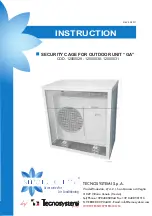
10
3. INSTALLATION
(
CONT
’
D
)
3.7 C
ONNECTING
THE
D
UCTS
TO
THE
U
NIT
NOTE: All unit ports are were created to be connected to ducts having a minimum of 6” diameter, but if need be, they can
be connected to bigger sized ducts by using an appropriate transition (e.g.: 6” diameter to 7” diameter transition).
Insulated flexible ducts
Use the following procedure to connect the insulated flexible ducts to the ports of the unit (
Exhaust air to outside
and
Fresh air from
outside
ports).
CAUTION
If ducts have to go through an unconditioned space (e.g.: attic), always use insulated ducts.
1.
Pull back the insulation to expose the flexible duct.
2.
Attach the flexible duct to the port using tie wrap.
3.
Pull the insulation over the joint and tuck in between the inner and outer rings of the double collar.
4.
Pull down the vapor barrier (shaded part in illustrations below) over the outer ring to cover it completely. Fasten in place the vapor
barrier using the port strap (included in unit parts bag). To do so, insert one collar pin through vapor barrier and first strap hole,
then insert the other collar pin through vapor barrier and center strap hole and close the loop by inserting the first collar pin in the
last strap hole.
CAUTION
Make sure the vapor barrier on the insulated ducts does not tear during installation to avoid condensation within the ducts.
VJ0067
C
OLLAR
PIN
Non-insulated rigid ducts
Use metal screws and duct tape to connect the rigid ducts to the
unit ports.
Non-insulated flexible ducts
Use tie wraps to connect the flexible ducts to the unit ports.
VJ0066
C
OLLAR
PIN










































